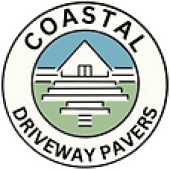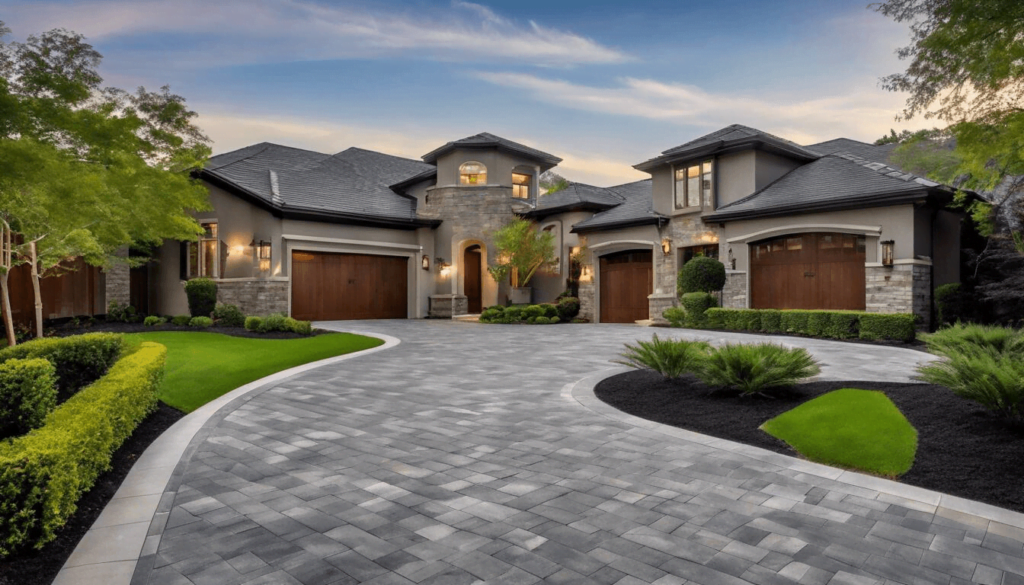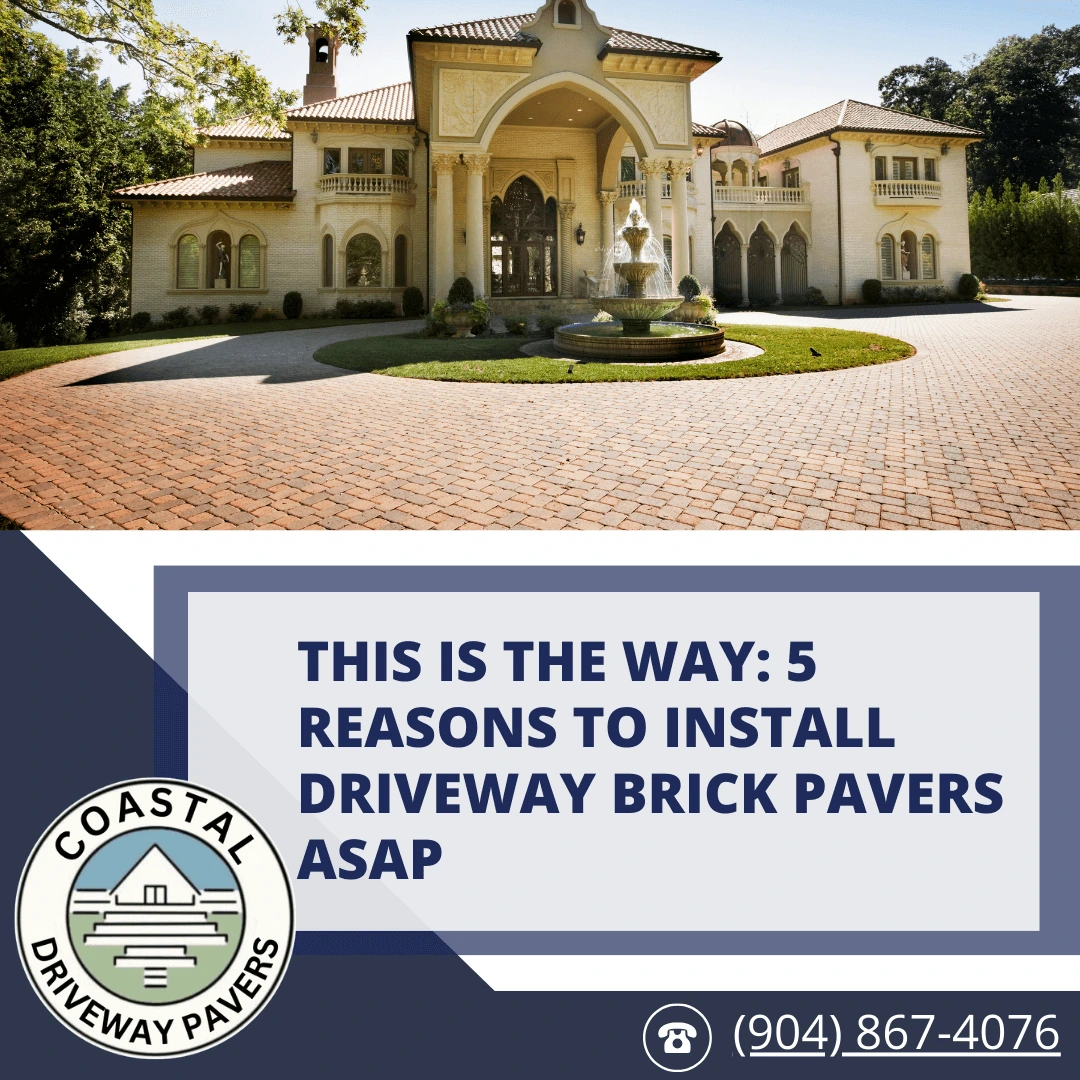One of the paver driveway ideas that helps boost your curb appeal is by incorporating a timeless herringbone pattern, which adds elegance and sophistication. Another option is to opt for a sleek running bond pattern, providing a modern yet understated appeal. Additionally, consider a statement mosaic design for a unique outdoor statement piece.
Remember that choosing the right design depends on your home’s architecture and your style.
Designing your driveway with pavers is not just about creating a path for vehicles. It’s about crafting an entrance that enhances the aesthetic appeal and functionality of your home. Here’s how you can transform your driveway with these paver design ideas:
1. Traditional Design
Traditional design leans towards symmetry, balance, and a sense of formality. Straight lines and formal entrances are hallmarks of this style. Thus, reflecting an orderly, classic appearance that complements many architectural styles, especially colonial, Victorian, and Craftsman homes.
For a traditional driveway, consider using driveway paver patterns that evoke timelessness and elegance:
- Herringbone: Offers a sophisticated look with its interlocking arrangement, providing strong visual interest and durability.
- Basketweave: This classic pattern adds quaint charm, ideal for historic or traditional homes.
- Running Bond: With bricks or pavers laid end to end, this pattern creates the illusion of length or width, making it versatile for any driveway size.
2. Modern Design
Modern driveway designs emphasize clean lines, geometric patterns, and a minimalist approach, which combines materials to achieve a contemporary look. This style complements modern, industrial, and mid-century modern architecture.
Achieve a contemporary look by:
- Combining Concrete and Natural Stone: This mix balances the cool modernity of concrete with the warmth of stone.
- Integrating Glass or Metal Accents: For an ultra-modern edge, incorporate glass elements or metal edging.
- Geometric Patterns: Use large-format pavers in geometric shapes, or arrange smaller pavers in modern patterns like a staggered bond or a linear layout with varying lengths.
3. Rustic Design
The rustic design draws inspiration from nature, emphasizing organic shapes and textures. It’s perfectly suited for cottages, country homes, or any residence that cherishes the beauty of the natural world.
Achieve a rustic look by:
- Laying Irregularly Shaped Pavers: Mimic natural landscapes using flagstone or irregularly shaped pavers for a more relaxed path.
- Incorporating Gravel with Pavers: Gravel, interspersed with larger pavers, adds texture and reinforces the rustic appeal.
- Natural Stone Borders: Frame your driveway with natural stone borders to enhance its cozy, earthy feel.
4. Mediterranean Design
Mediterranean design is known for its use of warm, earthy tones, like terracotta, ochre, and olive green, reflecting the sun-drenched landscapes of the Mediterranean region.
To capture the essence of Mediterranean style:
- Terra Cotta Pavers: These pavers themselves are a strong foundation for Mediterranean design, offering rich, warm tones.
- Mosaic Inlays: Incorporate mosaic tile inlays at intervals or as borders to introduce color and pattern.
- Mixed Materials: Combine terra cotta with natural stone or decorative tiles to create intricate patterns or focal points.
Each design style offers a unique way to enhance your driveway. Whether you prefer traditional, modern, rustic, or Mediterranean designs, carefully selected pavers can turn your driveway into a masterpiece of form and function.
Materials and Their Unique Characteristics
Choosing the right material for your driveway is crucial for its appearance, longevity, and sustainability. Each type of paver offers distinct colors, textures, and benefits. Let’s explore the characteristics of various paver materials:
Concrete Pavers
Concrete pavers are known for their versatility in color and texture, offering homeowners a wide range of customization options. They can be manufactured in various hues, from natural earth tones like gray, tan, and red to more vibrant colors that mimic the look of natural stone or brick. Textures vary widely as well, including smooth finishes for a modern look, tumbled for a more worn and rustic appearance, and cobblestone textures that add depth and historical charm to your driveway.
Concrete pavers are not only aesthetically pleasing but also incredibly durable. They are designed to withstand heavy loads, making them ideal for driveways. These pavers are also resistant to weathering, cracking, and fading. Maintenance is relatively straightforward, requiring only regular sweeping and occasional rinsing with water. Should a paver become damaged, it can be easily replaced without disturbing the surrounding area, ensuring your driveway remains pristine for years to come.
Brick Pavers
Brick pavers offer a timeless appeal, with their warm tones and classic look enhancing the curb appeal of any home. Colors range from traditional red to more muted tones such as antique white and charcoal. Thus, allowing for a high degree of customization to match or complement your home’s exterior.
The charm of brick pavers is often accentuated by the patterns in which they are laid. Herringbone, basketweave, and running bond are popular choices, each lending a unique personality to the driveway. These patterns not only enhance the visual appeal but also contribute to the structural integrity of the driveway surface.
Natural Stone Pavers
Natural stone pavers, such as flagstone, travertine pavers, and bluestone, offer unmatched natural beauty and uniqueness. Each piece varies in color, texture, and pattern, providing a luxurious and bespoke look for your driveway. These materials blend seamlessly with the surrounding landscape, enhancing the natural appeal of your outdoor space.
The finish of natural stone pavers plays a significant role in their appearance and functionality. Honed finishes provide a smooth, matte surface, while tumbled finishes offer a more textured and rustic look. Brushed finishes strike a balance, offering a slight texture without being too rough. These finishes also affect slip resistance, with textured finishes providing better traction underfoot, making them safer during wet conditions.
Permeable Pavers
Permeable pavers are made from various materials, including concrete, brick, and plastic grids. They allow water to pass through the surface and into the ground below, reducing runoff and promoting natural water filtration. This feature offers significant environmental benefits, including reducing the strain on municipal stormwater systems and replenishing local groundwater supplies.
Permeable driveway pavers contribute to reducing the urban heat island effect. Traditional impermeable surfaces, such as concrete and asphalt, absorb and retain heat, significantly increasing urban temperatures. Permeable pavers, by contrast, allow the ground to breathe, reducing surface temperatures and contributing to a cooler environment.
Now equipped with innovative ideas and materials to enhance your driveway’s appeal, let’s explore the important considerations when designing your unique driveway masterpiece.
Considerations in Designing Your Driveway
When designing your paver driveway, it’s crucial to integrate it seamlessly with the natural lay of the land. The slope and layout should not only provide practical access but also merge elegantly with the surrounding terrain, enhancing the visual impact while maximizing accessibility and functionality. Think of it as creating a nature park where everything feels interconnected and thought out—your driveway should evoke a similar feeling.
Consider how your driveway fits into the overall landscape. For instance, if you live on a sloped property, a terraced design might be more suitable. Additionally, incorporating retaining walls or landscaping features can prevent soil erosion and keep the driveway stable, ensuring it feels like an integral part of your property’s overall aesthetic.
Local Climate Resilience
The durability of your paver driveway is vital when considering the local climate. Your choice of pavers needs to withstand the elements specific to your area – whether it’s intense sunlight, heavy rainfall, or freezing temperatures. It’s essential to think about how different paver materials will behave throughout the seasons.
For example, in areas with hot weather, select pavers that are heat-resistant and won’t become too hot to walk on. In regions with frequent rainfall, permeable pavers can help manage water runoff effectively and prevent pooling or erosion. Furthermore, in colder climates, opting for non-slippery pavers that can withstand frost will ensure safety during icy conditions.
Choosing pavers that can endure your local climate ensures that your driveway will maintain its appearance and functionality over time. This resilience enhances your property’s value by avoiding early deterioration and costly replacements or repairs.
Taking into account these essential factors when designing your driveway sets you up for a beautiful, functional feature that harmonizes with the natural surroundings and remains resilient against the local climate, thereby adding significant value to your property.
Finishing Touches for a Complete Look
The final touches to your driveway extend beyond the selection of a paver. Carefully chosen lighting, edging, and landscaping can transform a simple driveway into a stunning entrance that complements your home’s exterior and welcomes guests with style. Here’s how you can add those finishing touches to achieve a complete look.
Driveway Paver Lights
- Path Lights: Path lights are essential for illuminating the driveway and guiding visitors to your front door safely. They can be spaced along the edges of the driveway, casting a gentle light that highlights the pavers and ensures visibility at night. Choose designs that match the style of your home and landscape for a cohesive look.
- Up Lights: Up lighting is a dramatic way to accentuate specific features along your driveway, such as trees, sculptures, or architectural elements of your home. Positioned at the base of the feature and directed upwards, these lights create a focal point and add depth to the landscape at night.
- Solar Pavers: For an innovative and eco-friendly lighting solution, consider integrating solar pavers into your driveway design. These pavers have solar cells that charge during the day and light up at night, providing ambient lighting without the need for wiring or electricity. Solar pavers are an excellent way to blend functionality and sustainability seamlessly.
Driveway Paver Edging Choices
- Metal Edging: Metal edging offers a sleek and modern boundary for your driveway, creating a defined line between the driveway and adjacent landscaping or lawn. It’s durable, easy to install, and provides a minimalist look that can complement contemporary home designs.
- Concrete Curbing: Concrete curbing is a versatile edging option that can be customized in color and shape to match or contrast your driveway pavers. It serves as a robust barrier to keep grass and garden beds in place, contributing to a neat and orderly appearance.
- Natural Stone Border: A natural stone border adds a touch of elegance and rustic charm to your driveway. Whether you choose flagstone, limestone, or another natural stone, this edging option can enhance the organic beauty of your landscaping while providing a durable boundary.
Landscaping Integration
- Flower Beds: Incorporate flower beds along the sides of your driveway to add color, texture, and visual interest. Select perennial flowers and plants that complement the colors of your pavers and bloom at different times of the year for continuous appeal.
- Shrubs: Shrubs can offer structure and privacy to your driveway. Choose varieties that match the scale of your driveway and home, and consider their growth habit and maintenance needs. Evergreen shrubs can provide year-round color and texture.
- Trees: Lining your driveway with trees creates a grand entrance and can offer shade, reducing the heat absorbed by the pavers. Choose species that are suited to your climate and soil type, and consider their mature size to avoid future issues with roots or canopy spread.
Combining these finishing touches with your chosen pavers can enhance the look and feel of your driveway. Lighting adds safety and ambiance, edging defines the space and adds character, and landscaping integrates the driveway into the natural surroundings, creating a welcoming approach to your home.
If you’re considering revamping your driveway, make sure to explore various creative paving ideas that align with your local preferences and trends. By doing so, you’ll not only enhance the aesthetic of your property but also potentially increase its resale value. To take the first step towards transforming your driveway, contact us at Coastal Driveway Pavers or call us at (904) 867-4076.
Frequently Asked Questions
Selecting the right material for your paver driveway depends on several factors, including budget, climate, desired maintenance level, and aesthetic preference. Concrete pavers offer versatility and durability at an affordable price, making them suitable for various designs and climates. Brick pavers provide a classic look with a range of warm tones and require minimal maintenance. Natural stone pavers offer unique beauty and durability, ideal for a high-end look, but can be more expensive. Permeable pavers are an eco-friendly option, reducing runoff and supporting sustainable landscaping. Consider these factors about your specific needs and preferences to make the best choice.
While it is possible to install a paver driveway yourself, it requires careful planning, physical labor, and a solid understanding of the installation process to ensure durability and proper drainage. DIY installation can be more cost-effective but may not offer the same level of precision and longevity as professional installation. For best results, especially for complex designs or large areas, hiring a professional contractor like Coastal Driveway Pavers is recommended.
Paver driveways can last 30 years or more when properly installed and maintained. The longevity of your driveway will depend on the type of pavers used, the quality of installation, and regular maintenance practices, such as paver sealing, cleaning, and replacing any damaged pavers.
Yes, permeable pavers are highly effective for stormwater management. They are designed to allow water to pass through the surface and into a specially prepared base layer that filters and directs the water back into the ground or a drainage system. This reduces runoff, helps to replenish groundwater supplies, and mitigates flooding risks, making them an environmentally responsible choice for driveways.
Generally, it is recommended to seal concrete and brick pavers every 3 to 5 years to protect against staining, fading, and wear. The frequency of sealing your paver driveway depends on the type of pavers used, your climate, and the level of traffic and wear. Natural stone pavers may require different maintenance schedules based on the type of stone and finish.
Maintaining a paver driveway involves regular sweeping to remove debris, occasional rinsing with a hose to keep it clean, and pulling any weeds that may grow between the pavers. It’s also important to replace any cracked pavers promptly and consider resealing the driveway periodically to protect against weathering and staining. Properly installed and maintained paver driveways require minimal upkeep compared to other driveway materials.

Written By:









